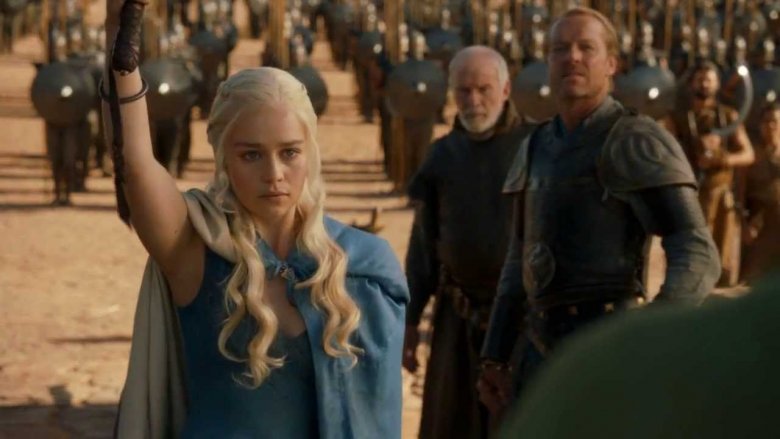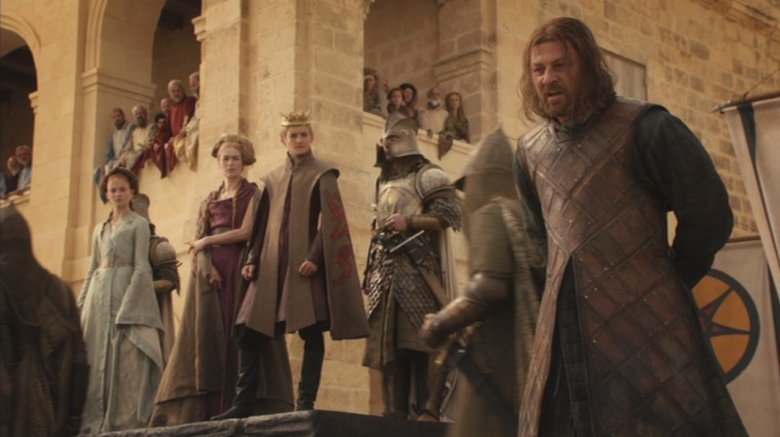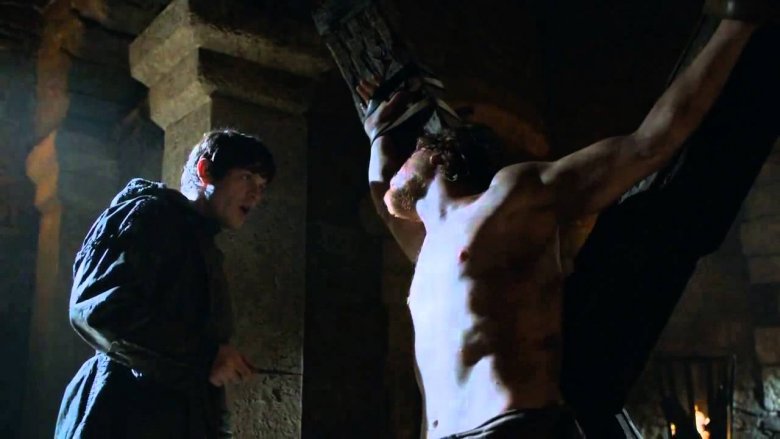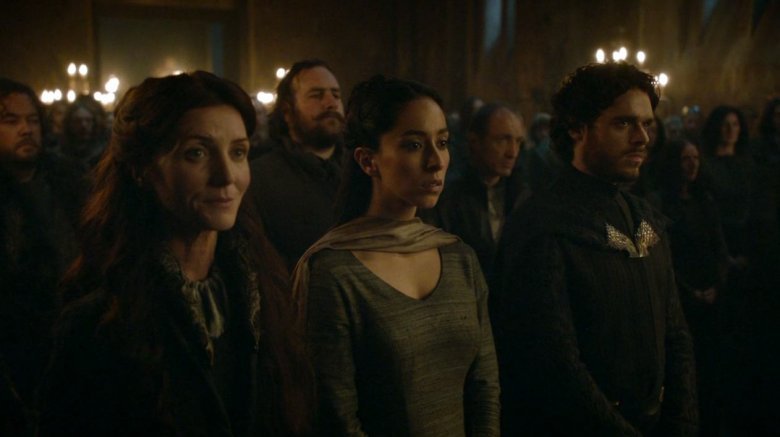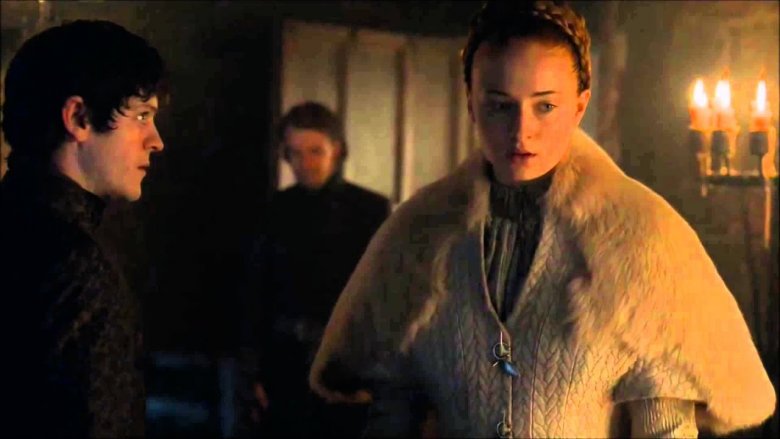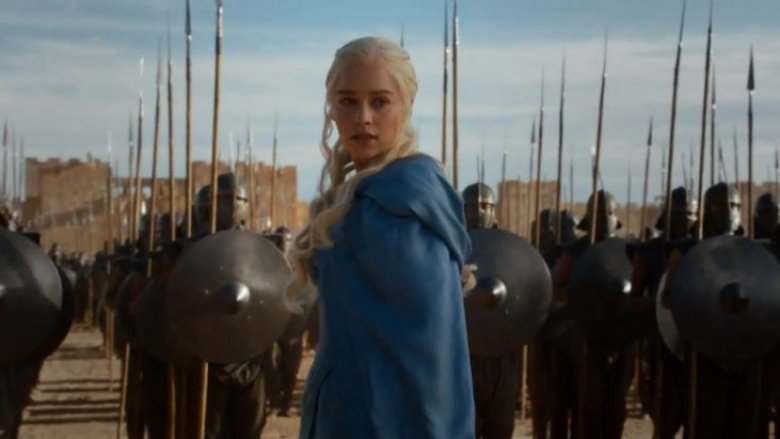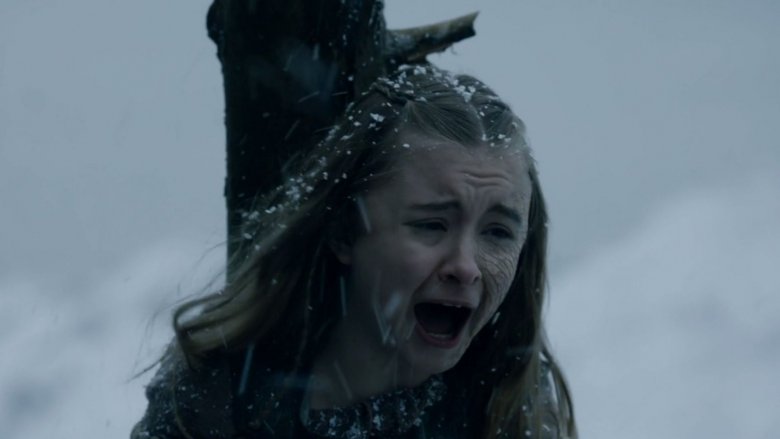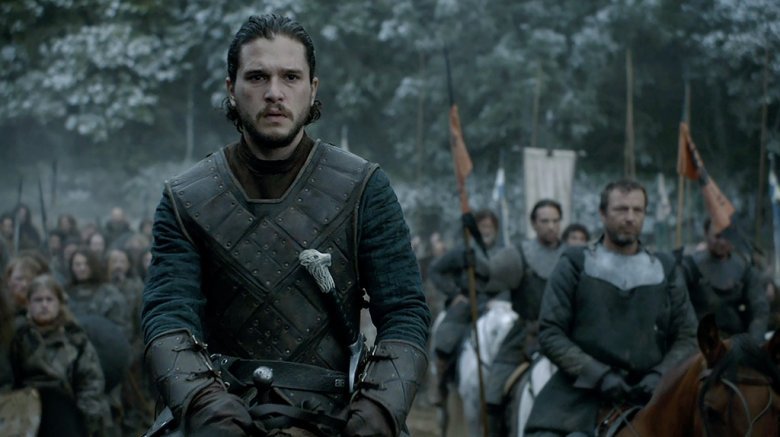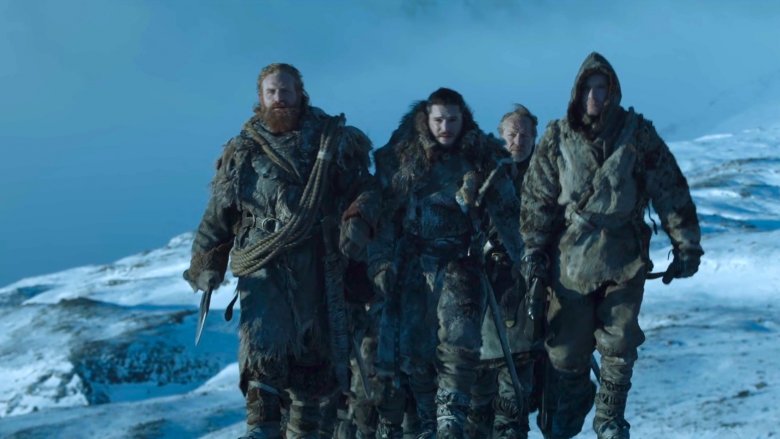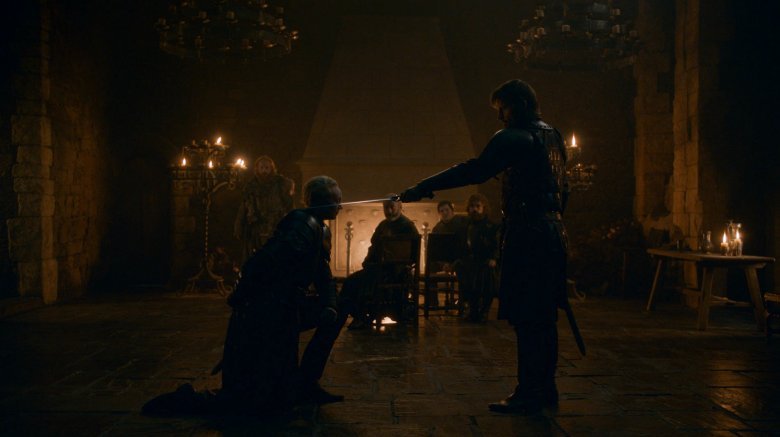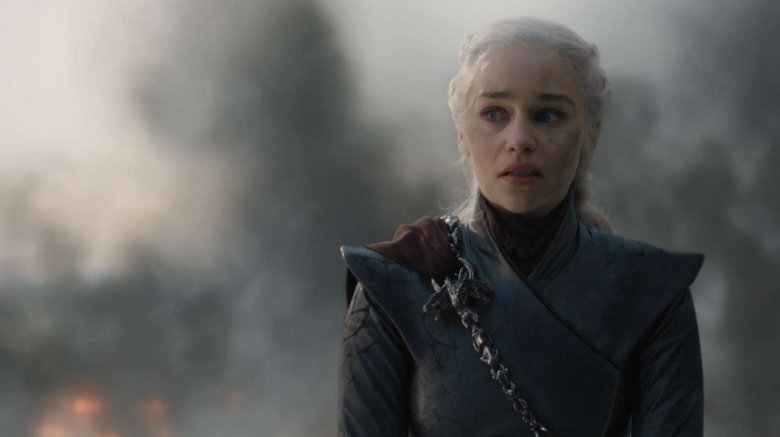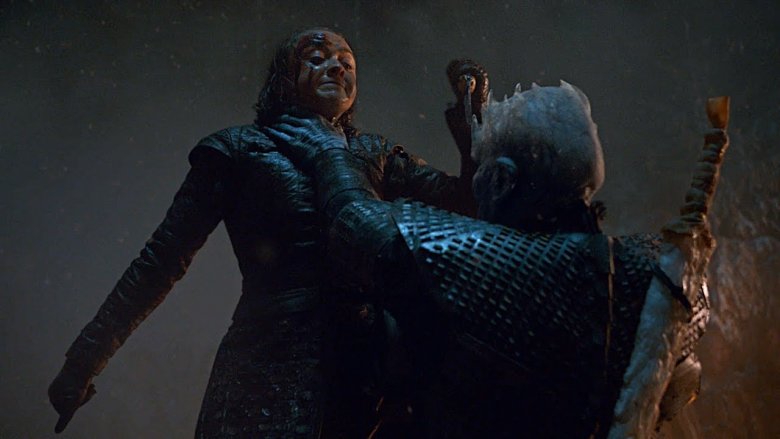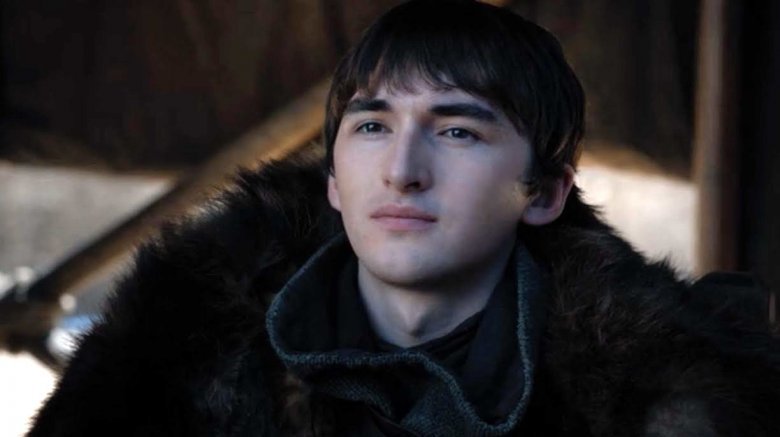6 Best And 6 Worst Game Of Thrones Moments Of The Entire Series
HBO's Game of Thrones ended its epic eight season run in May of 2019 with one of the most highly anticipated series finales in television history. After years of waiting to see who would live, who would die, and who would take the Iron Throne, viewers finally got their answers... even if they didn't necessarily love what those answers turned out to be.
The final season and series finale may not have lived up to the incredibly high standards set by the show's fans, but since its premiere in 2011, Game of Thrones gave audiences some incredibly memorable moments. For better or for worse, the show cemented itself as one of the biggest pop culture phenomenons of all time. However, along with the highs come the lows, and Thrones certainly left audiences furious as well as exhilarated throughout its run. Here are just some of the absolute best and absolute worst moments throughout the entire series of Game of Thrones. Spoilers to follow for the entire show!
Best: Ned's execution
When Game of Thrones, based on George R.R. Martin's Song of Ice and Fire series (the first installment of which is called A Game of Thrones), first premiered, casual viewers could be forgiven for assuming it was just another fantasy show filled with monsters, dragons, and people in castles having long political conversations. Those who had read the novels knew better — Martin wrote a huge twist right into the first book, which the show spectacularly brought to life in the penultimate episode of the first season.
Non-book readers probably assumed that Ned Stark (Sean Bean), the honorable and righteous Warden of the North turned Hand of the King to Robert Baratheon, was the hero of the entire show. Even though showrunners David Benioff and D.B. Weiss were simply following Martin's plot, it was an incredible shock and surprise to those fans when Ned Stark lost his head, executed for high treason for (correctly) claiming that Robert's children were illegitimate and not the heirs to his throne. In beheading Ned, the show also set up the conflict to come between the Stark family and the Lannisters, the royal family behind the Stark patriarch's death. Expertly subverting audience expectations, this classic moment has since become iconic, and set up not only the next war to come, but showed everybody what kind of show Thrones really is.
Worst: All of Theon's torture scenes
Theon Greyjoy (Alfie Allen) kicks off Thrones as the cocky, irritating ward of the Stark family. He's soon knocked down several pegs when he ends up a prisoner of the sadistic, evil Bolton family (when a house's sigil is a flayed man, you can be pretty sure they're bad guys). As Reek, the captive of torturer Ramsay Bolton (Iwan Rheon), Theon loses himself entirely. He also loses several fingernails and his "favorite toy," which Ramsay sends to Theon's family in the Iron Islands, to add insult to literal injury.
These extended scenes, which showed Theon's torture in excruciating detail (as well as Ramsay's ensuing glee), went on way too long and likely alienated some of Thrones' more squeamish fans. Ultimately, the point was made after one or two scenes. Even Alfie Allen admitted the scenes gave him PTSD because they were so difficult for him to shoot, lending another level of unpleasantness to them altogether. Not only did it feel unnecessary to keep showing Theon's dehumanization, but it felt entirely gratuitous, giving into one of Thrones' worst impulses.
Best: The Red Wedding
It might seem insane to describe anything about the Red Wedding as the "best," but despite the horrific, devastating events of the scene, there's no denying that it's one of the signature moments of Thrones' run. Like Ned Stark's execution before it, it set a heartbreaking standard for the carnage to come. After betraying his promise to marry one of his allies' daughters, Robb Stark (Richard Madden), his mother Catelyn Stark (Michelle Fairley), and his wife Talisa (Oona Chaplin) attend the wedding of Catelyn's brother and the daughter of Walder Frey (David Bradley), the very ally to whom Robb broke his word. Everything seems like it's been smoothed over at first, but when the doors lock behind the Starks and "The Rains of Castamere" starts playing, it becomes clear that things won't end well for these particular guests.
From the heart-stopping moment where Catelyn realizes one of the other guests is wearing armor to shots of Robb crawling to his dying wife's side after he's been shot by multiple arrows to Catelyn's final, silent moment as she slits Frey's daughter's throat only to be executed herself, the Red Wedding is one of the hardest scenes to watch in all of Thrones. Still, its signature violence, shock value, and careful direction make it one of the show's most important moments as well.
Worst: Moments of assault
Game of Thrones has often been accused of being rough on its female characters, and though it has given audiences feminist icons like Arya Stark and Brienne of Tarth, it has also put some of its women through hell. On Daenerys Targaryen's (Emilia Clarke) wedding night in the pilot, she is raped by her new husband Khal Drogo, with whom she can't even communicate thanks to a language barrier. Despite the fact that Cersei Lannister (Lena Headey) was one of the most despised characters on the entire show, when her twin brother Jaime (Nikolaj Coster-Waldau) raped her in front of their son's dead body during the show's fourth season (based on a scene from the books where they had consensual sex), fans revolted, calling the scene out for being both upsetting and gratuitous.
The creators clearly didn't learn, because when Sansa Stark (Sophie Turner) ended up married to Ramsay Bolton, viewers hoped against hope that they'd be spared from seeing her wedding night. Instead, they were treated to a deeply upsetting, horrific scene filmed entirely from Theon's perspective as he watches Ramsay rape and brutalize a sobbing Sansa, which could be heard offscreen but not seen. To drive the point home, Sansa spends several subsequent episodes visibly bruised and beaten, just to point out that Ramsay is still abusing her. Rape as a plot device is pretty repulsive, and those moments represent some of Thrones' lowest points.
Best: Daenerys destroys Astapor
Daenerys Targaryen might have closed out the show as the Mad Queen, stabbed by her lover after destroying a city full of innocents, but once upon a time, the Dragon Queen used her power and her dragons for good, not for evil. During her long journey to Westeros after her husband Khal Drogo's death, Daenerys encounters a part of the world where slavery is the norm. Horrified by the conditions of the enslaved, she begins a mission to take down the masters and liberate entire civilizations.
One of her first steps on this quest happens in the city of Astapor, where she bargains for an army of enslaved Unsullied soldiers (a huge masked group raised from children to show no fear and to carry out anything asked of them) using her largest dragon, Drogon. Her advisors are horrified that she would even consider giving up a dragon, but they don't know Daenerys has one huge trick up her sleeve. As soon as she has control of the Army, she addresses them in High Valyrian, tells the master (who has been mocking her behind her back in that language for several episodes) that a "dragon is not a slave," and torches him, killing the slavers until nobody is left standing except for her, her team, and her new army. As Daenerys makes her triumphant exit into the desert, it's impossible to not cheer for her, no matter what moments like this mean later in the series.
Worst: Shireen's execution
Some of Thrones' more disturbing moments have been centered on completely unnecessary and senseless violence. While moments like Ned's execution and the Red Wedding served undisputed narrative purpose, there are just some moments that are horrible to watch and end up having no necessary effect on the story in the long run. One such moment is the execution of Shireen Baratheon (Kerry Ingram), which remains one of the most painful scenes for new viewers and veteran fans alike.
As the daughter and only child of Stannis Baratheon (who, as Robert's brother, was a serious contender for the Iron Throne), Shireen is known to those who love her as the Princess Shireen, though she is usually hidden away thanks to the greyscale scars that mar her face (though she suffered from the usually fatal disease as a baby, healers were able to stop the spread). Beloved by Stannis' right hand man Davos Seaworth (Liam Cunningham), Shireen is a gentle, generous, and kind girl who teaches both Davos and the wildling Gilly (Hannah Murray) how to read, which makes it even more awful when the Red Priestess Melisandre (Carice van Houten) burns Shireen alive as a sacrifice to the Lord of Light in a last-ditch effort to help Stannis win the throne. Viewers are forced to watch and listen as Shireen screams and struggles to escape, and even in such a brutal series, it remains one of the cruelest moments.
Best: Battle of the Bastards
Game of Thrones fans are no strangers to incredible battle sequences. From the explosive wildfire of "Blackwater" to the eerie climax of "Hardhome," viewers have been delighted, stunned, and just generally blown away by the enormous action setpieces the cast, crew, and showrunners have been able to create over eight seasons. It's hard to choose just one battle from the plethora of incredible scenes in Thrones, but if only one can make the list, it has to be "The Battle of the Bastards," the penultimate episode of the show's sixth season.
From start to finish, the Battle of the Bastards is a nail-biting, perfectly shot, and ultimately satisfying thrill ride, as Jon Snow (Kit Harington) and his dwindling forces face down Ramsay Bolton and his massive army for control of Winterfell. For a second, it seems as if Jon and his army might suffer a massive defeat, but when the Knights of the Vale join them at the eleventh hour, they eventually reign supreme, paving the way for Jon and Sansa to reclaim their childhood throne. Each brutal moment, like when Ramsay kicks off the battle by killing Rickon (the youngest Stark) or when Jon is nearly crushed to death under horses and soldiers, is balanced by victorious moments like the Stark banner unfurling on Winterfell's ramparts or Sansa feeding a bloodied, beaten Ramsay to his own hungry hounds, giving viewers tension and satisfaction in equal measure.
Worst: Mission to capture a wight
If Thrones' big action setpieces comprise some of the show's best moments, there are still a few that make up the worst, thanks to sloppy narratives and wildly inconsistent character decisions. In the seventh season's "Beyond the Wall," Jon and a group of allies travel far North to capture a lone wight (a pretty dumb idea to begin with, considering that wights don't usually wander around by themselves waiting to be captured). They intend to bring it to King's Landing and show it to Cersei (a woman who truly doesn't care who lives or dies as long as it's not her children or her brother), thus proving to her that the threat of the Army of the Dead is not only real, but on its way to Westeros.
Of course, the whole thing goes off the rails pretty much immediately, when one of their number is mauled by a zombie polar bear. By the end, the gang has captured a wight, but they're stuck on an ice floe surrounded by the dead. They're narrowly saved when Daenerys shows up with her dragons, but before they can leave unscathed, one of Daenerys' dragons is killed (and subsequently zombified) by the Night King, and Jon is left behind and nearly dies. Game of Thrones is full of stupid plans, but this one pretty much takes the cake for the stupidest one of all.
Best: Brienne is knighted
Throughout the series, the towering, formidable Brienne of Tarth (played perfectly by Gwendoline Christie) has been one of the emotional centers of the show, even though Brienne herself can be a bit inscrutable. Unfailingly loyal, Brienne is originally pledged to King Renly Baratheon. After his death, she ends up by Catelyn Stark's side, promising to protect the Stark daughters, which she does until the series' end. Brienne isn't a knight, but she prefers not to be called "Lady Brienne" either, so her identity remains in flux until she receives a huge title courtesy of Jaime Lannister, with whom Brienne is hopelessly in love.
Jaime and Brienne share a deep mutual respect for one another after their time as allies, and on the eve of the Battle of Winterfell, he realizes that as a knight, he has the power to name anybody he wants as a knight as well. In an emotional and well-earned scene, he asks Brienne to stand, anointing her as the first ever female knight of the Seven Kingdoms. Brienne rises as Ser Brienne of Tarth, recognized likely for the first time in her life. After Jaime perishes in the siege of King's Landing, Brienne rises even higher, becoming Lord Commander of the Knightsguard in his stead. To achieve her destiny, all she needed was that first step.
Worst: Daenerys goes full Mad Queen
As the Mother of Dragons and Breaker of Chains, Daenerys always exhibited a vengeful, angry streak. Plenty of fans theorized that before the show ended, she would follow in her father's footsteps and become the Mad Queen (her dearly departed dad, King Aerys II Targaryen, went insane before he was murdered by Jaime Lannister for trying to destroy King's Landing with wildfire). After everything Daenerys went through, it's not completely unreasonable for her to lose her cool a little bit, but once she starts barbecuing potential allies simply because they hesitate to bend the knee to her, even her closest advisers start getting pretty nervous.
All of this comes to a gruesome head in "The Bells," the penultimate episode of the entire series, which focuses almost entirely on Daenerys' violent siege on the capital city of King's Landing as her forces surge against Cersei and the Lannister army. Even though Tyrion (Peter Dinklage), Daenerys' Hand of the Queen, begs her before the battle to cease fire once the bells ring in surrender, the mere toll of the bells seems to send Daenerys into an all-consuming and kind of random rage, leading her to blast the entire city with fire and kill countless men, women, and children who can't fight back. This twist wasn't unexpected, but it was entirely unearned in the moment, playing on tropes and cliches to achieve Daenerys' violent ends.
Best: Arya kills the Night King
The Battle of Winterfell, which pitted the humans of Winterfell against the seemingly unbeatable Army of the Dead, was one of the most anticipated events in all of Thrones, the White Walkers having made their way towards Westeros over season after season. The humans, armed with Valyrian steel and dragonglass (the only two weapons that can destroy a White Walker) as well as two large dragons, know that even though they can hold off the dead for a while, there's only one thing they can do to win: defeat the otherworldly Night King, and every Walker or wight he's created will fall with him.
Jon keeps trying to get at the Night King, but he fails over and over again. All hope seems lost as the Night King approaches Bran Stark (Isaac Hempstead-Wright) in the Godswood — that is, until a new contender literally leaps out of the woodwork to take him down. Unbeknownst to everyone and spurred by one of Melisandre's prophecies, Arya Stark (Maisie Williams) uses her training as a fierce, faceless assassin to sneak past the undead army and attack the Night King. With a combination of a Valyrian steel dagger and deft handwork, Arya is the one who destroys the greatest threat to humanity. An entirely earned and deeply satisfying moment, it came late in the game, but holds a place among the series' best.
Worst: A new king is crowned
In the aftermath of Daenerys' death at the hands of Jon Snow (even though he's now marked as a criminal and a queenslayer, he did it for the good of the realm), a new leader must be chosen to rally King's Landing now that both warring queens are no more. As a result, the series finale finds the high-ranking lords and ladies of Westeros gathered to figure out how they'll possibly proceed from here. Tyrion, also under fire for betraying Daenerys before her death, is asked who he thinks should rule, and makes a rather extraordinary proclamation. Bran, who has become the all-seeing and totally aloof Three-Eyed Raven over the course of the show, is, according to Tyrion, the most logical choice to lead Westeros.
Bran's coronation isn't without foreshadowing, but as with Daenerys' sudden pivot into madness, it's a moment that feels entirely unearned and completely unsatisfying, not to mention all of the logistical issues involved. Bran, who usually seems supremely uninterested in petty human affairs, is probably a pretty bad choice to be the king to thousands of civilians with very human problems, and the optics of having a monarch who can see the past, present, and future are a little unsettling. In the end, Bran as king caused plenty of dissent among Thrones fans, and it's not hard to understand why.
